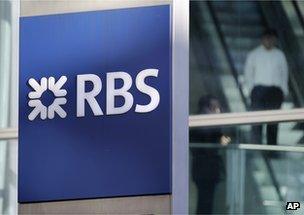Heads may roll at RBS over Libor
- Published
- comments

RBS is currently negotiating with regulators over fines related to Libor transgressions.
Royal Bank of Scotland is in the last delicate phase of negotiations with regulators in the UK and US on the fines to be paid for its Libor transgressions and other necessary remediation, including a possible senior resignation.
What is clear is that UK and US fines will run to several hundred million pounds, or more than the £290m extracted from Barclays.
What is as yet undecided is whether RBS will be punished on a similar scale to UBS, which was spanked to the tune of £940m. My understanding is that RBS believes its fines will be less than UBS's.
RBS is braced for substantial humiliation as and when the announcement is finally made.
Emails from traders cited as evidence for the Libor rigging are particularly lurid, according to sources.
Also, the market manipulation continued well into 2010, or long after RBS's management was replaced at the end of 2008 following the collapse of the bank and its partial nationalisation. RBS's board did not become aware of the wrongdoing until notified about it by regulators in 2011.
That said, I have learned that the bank's board does not believe the chief executive Stephen Hester needs to resign: no evidence has been found indicating that he knew about the attempt to make unfair profits by fixing the Libor rates; and he was fully occupied at the time trying to rebuild the bank's shattered finances.
However I understand the FSA is looking for personal responsibility to be taken.
RBS's board will not wait for an instruction from the FSA to change personnel. I have learned that it is considering asking the head of the investment bank, John Hourican, and the head of markets, Peter Nielsen, to quit.
That said, there is no evidence that either of them were aware of the Libor malpractices or in any way encouraged them. But after the financial crisis they were brought in to fix RBS's investment bank, and the concern is that they did not get to grips with the market rigging that continued on their watch.
"There is an issue about why the rotten culture wasn't cut out earlier", said a source.
Also, the FSA is arguing that bonuses earned by executives and investment bankers in the period should be repaid or clawed back. This can only happen in relation to bonuses that were deferred. So at risk are those who were promised bonuses in 2009 and 2010, but haven't yet received all their entitlement.
"The likelihood is that there will be a claw back from the 2009 and 2010 bonus pools" said a source.
As for the fines and penalties, they are set according to a formula based on the magnitude of the wrongdoing in each of Libor's myriad currency categories.
RBS traders tried to manipulate the Libor interest-rate benchmarks for dollars, Swiss francs and yen, inter alia, according to a source. But whether the cumulative impact of its market rigging was more or less great than UBS's is - I am told - still undetermined.
As I understand it, the UK's Financial Services Authority is trying to persuade US regulatory authorities, led by the Department of Justice in Washington, to go for a big bang announcement of punishments for RBS in the week after next.